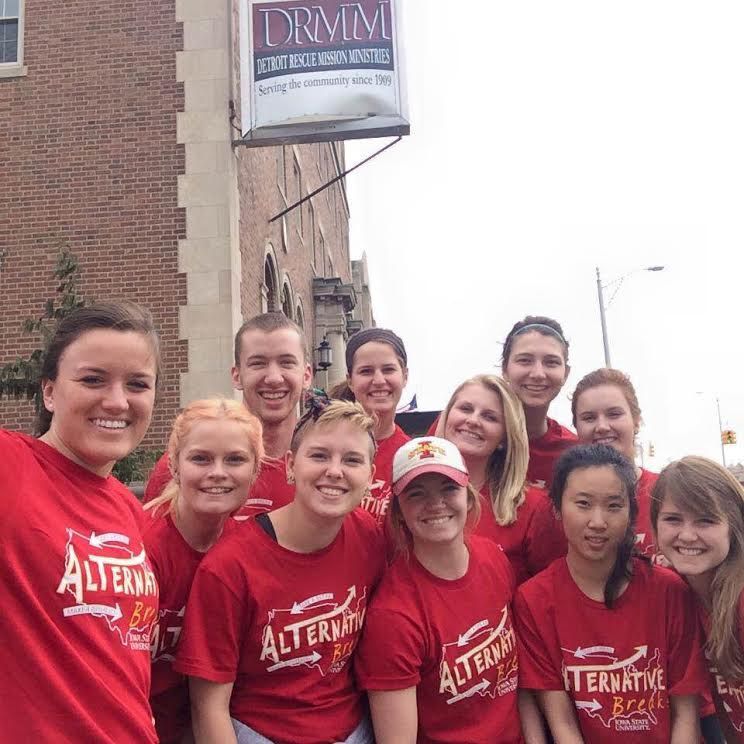Giving Back: Alternative Spring Break program offers service trips to students
March 24, 2015
For many, Spring Break is a week spent drinking on a warm beach or just lounging on the couch and watching an entire TV series on Netflix. For some ISU students, however, that’s not enough.
Last week, 77 students took part in Iowa State’s Alternative Breaks program, traveling across the country to donate their time and energy volunteering for numerous causes.
Amanda Ehlers, graduate assistant in the Student Activities Center, helps coordinate the program.
“We get groups of students together, they load up a van and we send them out to different states to volunteer for an entire week,” Ehlers said.
The seven-day trip costs each student less than $250.
“For this Spring Break, it’s about $175 to $250. That covers their transportation, their lodging and their food for the week,” Ehlers said. “We try to keep it fairly inexpensive.”
This spring there were five different trips, each to a different state. Students could volunteer at a homeless shelter in Detroit, an addiction rehabilitation center in Colorado, a humane society in Kansas, a safe house for victims of domestic violence in Texas, or a state park in Georgia.
Ehlers said each one provided plenty of different activities for participants.
“All of our trips have different itineraries,” Ehlers said. “But all involve working with people throughout the week and providing the places with general maintenance and upkeep.”
Many participating students gain valuable insight from their experiences on Alternative Break.
Hannah Nation, junior in event management, and Kelly Gray, senior in microbiology, spent the week as part of a group painting rooms, moving furniture and sorting donated clothing at Detroit Rescue Mission Ministries, an organization that helps those in poverty rebuild their lives.
“It was a great way to experience social issues that you do not encounter as readily in Ames, Iowa,” Gray said.
Nation said she will take her experiences back with her.
“I’ve learned to be grateful for what I have,” she said. “Being around people who don’t have much to call their own has really made an impact on me.”
Nolan Dickson, senior in chemical engineering, and his group spent the week at Harvest Farms, a fully-functional farm in Colorado that doubles as a rehabilitation facility for men with drug and alcohol addictions.
“The bulk of our activities involved work therapy, working with various farm animals, preparing meals in their industrial-sized kitchen, working garden plots, learning to weld, woodworking or helping build fence,” Dickson said.
Dickson said attendees were allowed to rotate which jobs they performed so they could get the most out of the experience, but there was also hard work.
“Monday, Tuesday, Thursday and Friday we lived on the farm and participated in the men’s schedule,” Dickson said. “We would get up for breakfast at 6:30, listen to devotion at 8, then work alongside them in the various work therapy areas during the morning and afternoon, split up by a shared lunch break.”
Dickson said the experience was not only gratifying to help others but he was helping men who were working hard to help themselves.
“For me, learning different skills from these men provided a significant growth opportunity,” Dickson said. “Having the opportunity to work on a farm and build relationships with men working toward new lives is not something that presents itself regularly to me, especially in such a neatly-organized week-long experience.”
Ehlers said that many people join the trips for those same reasons.
“I think a lot of our students are looking for a more meaningful way to spend their break,” Ehlers said. “Generally they say they don’t have plans, so they’d rather do something more meaningful than your stereotypical Spring Break.”
Nation agreed.
“It’s a great way to give back,” she said. “I would much rather spend time volunteering because it’s enriching my college experience and it’s helping others.”
Besides volunteering, students get to interact with each other and explore new places.
Dickson’s Colorado group had plenty of free time to bond during the week, enjoying games in their facility’s rec room, as well as taking a day trip to Fort Collins and Estes Park.
In Detroit, both Nation and Gray spent plenty of time touring as well.
“There were a lot of different areas we were able to see and it was incredibly interesting to see how the city varies,” Nation said. “We also did some sightseeing and went on a walk to see Canada across the river.”
Now in its eighth year, the Iowa State Alternative Break program is offered every winter and Spring Break. This Winter Break, two groups of students spent a week volunteering at a St. Louis food pantry and a homeless shelter in Kansas City.
During the course of this year, the program involved approximately 100 students and a total of seven different service trips. To join, students must fill out an online application, then go through a competitive interview process.
For Dickson, the effort it took to apply was well worth it.
“Alternative Breaks is such a positive alternative to the stereotyped college Spring Break because the experience invites students to step out of their comfort zones and contribute to a community,” Dickson said. “[It] creates an environment for individuals to learn more about themselves and connect with one another in meaningful ways.”
Nation felt the same way.
“It has opened my eyes to new things and I’ve met some lifelong friends along the way,” she said. “I would highly recommend anyone to go on an Alternatives Break trip.”

















